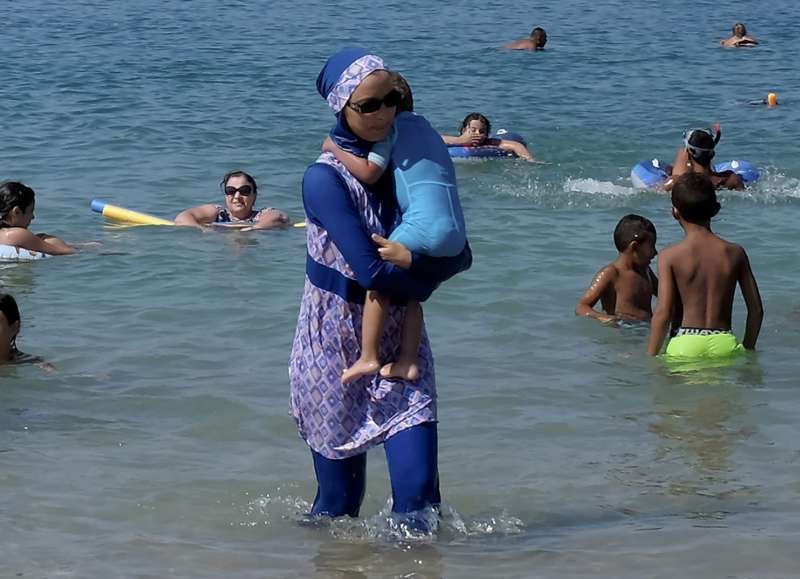
French exceptionalism is under fire. While the United States sees itself as the Earth’s last, best hope, leading the world for the better, France has long viewed itself as the world’s beacon of enlightenment, illuminating the planet with the sheer power of its conceptual and literary achievements. The irony is that the country which also gave the world Brigitte Bardot and the Vichy-checkered bikini is now fuming over the burkini issue. Our particular vision of secularism is under strain, and it is a source of misunderstanding among those who wonder how the motherland of human rights has become so oppressive.
Stringent secularism, supported to this day by a vast majority of French, stems from the bloody fight at the beginning of the 20th century between the government and the Catholic Church, which eventually lost control over the political, social and educational systems. Freedom of thought cannot be constrained, but for the French, religion is a private matter that has no say in the public space. It always comes as a surprise to us that in the United States, where the same distinction is enshrined in the Constitution, every coin is engraved with “In God We Trust” and every public oath is taken on the Bible.
In our lexicon, “La République” is one and indivisible. So is the Nation. It is therefore illegal to question a French citizen about his or her ethnic origin or religious beliefs, if any. As a result, there are no statistics about the number of Muslims — the estimate is that they represent roughly 8 percent of the population. Uncomfortable with our colonial past, oblivious to the demographic consequences of massive labor imports from North and Sub-Saharan Africa to sustain the economic boom of the 1960s, all governments, right and left, saw no harm in letting Arab regimes train and pay for foreign imams to shepherd the immigrant population.
Our elites have long shared the self-serving view that French values being universal, all children born in the country are bound to believe the Gauls are their common ancestors. Communitariansm, as practiced in “Anglo-Saxon” democracies, is considered evil, contrary to the very spirit of “La République.” Public policies have been based on “integration,” not on “assimilation,” and hammered into the culture like a healing mantra. Convinced like most of our politicians that once the right phrase has been coined, the problem is somehow solved, we have been horrified to discover that most of those murderers claiming to fight on our soil for radical Islam are French citizens — second- or third-generation children of immigrants whose religious beliefs were kept to themselves, and largely ignored by the authorities.
The country is reeling from a succession of terrorist attacks: The vision of a truck crushing bodies in Nice on Bastille night, and the old priest’s throat slashed in his church less than two weeks later are still on people’s minds. Until this summer, there had been few incidents with racial overtones against French Muslims. Tension has risen. Eight months ahead of the next presidential election, politics have come into play. The conservative opposition is eager to seize upon security as a key issue of the campaign. Most of the 30 mayors who have decided to ban the burkini on their beaches belong to Nicolas Sarkozy’s party. The former president has seized upon the burkini issue, labeling it a national identity crisis, trying to deprive the far right of its main argument to voters.
Manuel Valls, the Socialist prime minister, considers the burkini to be an Islamist provocation conveying “the idea that, by their nature, women are immodest, impure, that they should therefore be completely covered. It is not compatible with the values of France and the republic.” Previously the mayor of a surburban community near Paris where he witnessed the creeping influence of Salafist islam, Valls reflects a majority of French public opinion. But the burkini ban is against the law. The Conseil d’État, the highest administrative court in the country, ruled last Friday that local mayors have no right to decide what kind of clothing is appropriate or not, as long as the clothing does not pose a threat to public order.
The rule of law has prevailed. What remains at stake is the difficulty for French society, diverse as it has become, to accept multiculturalism and to adjust to it whilst maintaining its secular tradition. Ostentatious religious symbols have been banned from classrooms since 2004, and full-face veils have been forbidden since 2010 for public security reasons. Muslims should be protected from any risk of stigmatization just like other law-abiding citizens. But we have also fought long and hard for women to achieve the same rights as men — in any Western democracy, the burqa, or the burkini or any other attire imposed upon a woman’s body to deny her sex can hardly be seen as a token of progress.
Christine Ockrent is a Global Opinions contributing columnist.
